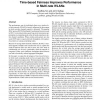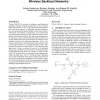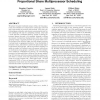339 search results - page 18 / 68 » Performance of Fair Distributed Mutual Exclusion Algorithms |
150
Voted
CISS
2008
IEEE
15 years 9 months ago
2008
IEEE
Abstract— We consider a joint randomized scheduling, congestion control mechanism for general wireless networks. We allow for a set of imperfections in the operation of the rando...
126
Voted
VTC
2010
IEEE
15 years 28 days ago
2010
IEEE
—This paper exploits the use of location information of wireless terminals to improve the performance of a beamforming system and support multiple access. Based on a system provi...
145
Voted
USENIX
2004
15 years 3 months ago
2004
The performance seen by individual clients on a wireless local area network (WLAN) is heavily influenced by the manner in which wireless channel capacity is allocated. The popular...
124
Voted
MOBICOM
2004
ACM
15 years 8 months ago
2004
ACM
Wireless IEEE 802.11 networks in residences, small businesses, and public “hot spots” typically encounter the wireline access link (DSL, cable modem, T1, etc.) as the slowest ...
161
Voted
PODC
2006
ACM
15 years 8 months ago
2006
ACM
We present Grouped Distributed Queues (GDQ), the first proportional share scheduler for multiprocessor systems that scales well with a large number of processors and processes. G...



